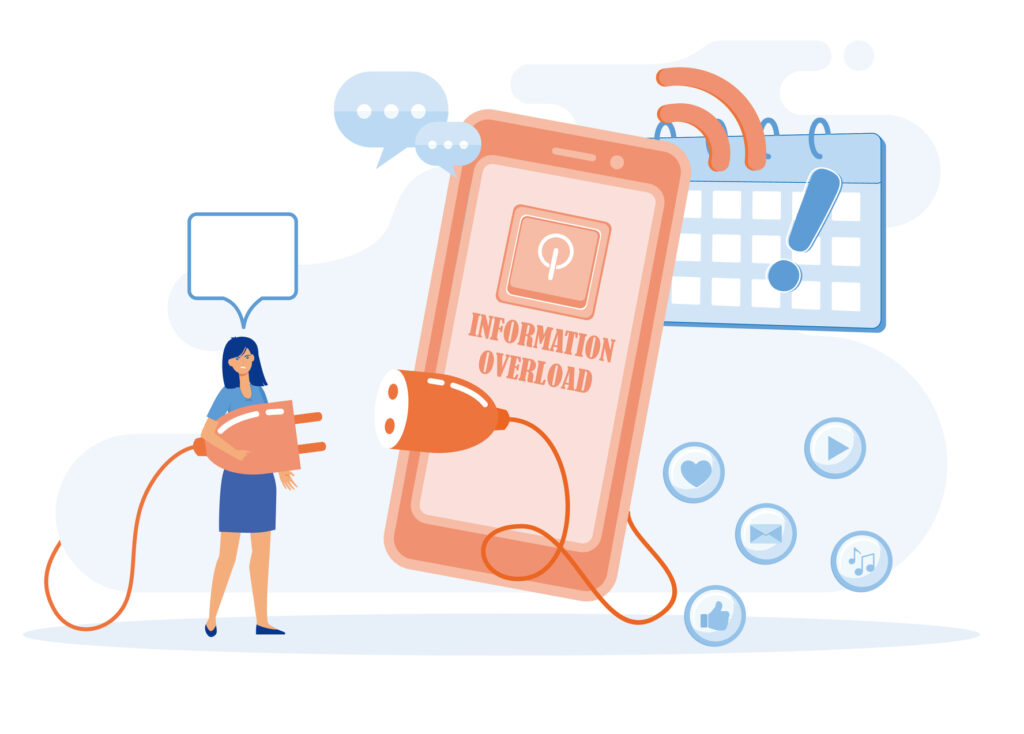 We live in the Information Age. It started with the transistor in 1947, but really took off with the advent of the internet in 1983. Since then, we’ve been bombarded with information. The term “information overload,” which is our inability to process all the information that comes our way, was coined 1964, but popularized by Alvin Toffler’s Future Shock in 1970. Since then, and due to digital technology, information overload has escalated. Over 328 million terabytes of data are created each day, or around 120 zettabytes in 2023 (there’s a table here to see the conversion of terabytes and zettabytes into bytes and gigabytes, which may make this statement more understandable to some but not me). According to one scholarly source:
We live in the Information Age. It started with the transistor in 1947, but really took off with the advent of the internet in 1983. Since then, we’ve been bombarded with information. The term “information overload,” which is our inability to process all the information that comes our way, was coined 1964, but popularized by Alvin Toffler’s Future Shock in 1970. Since then, and due to digital technology, information overload has escalated. Over 328 million terabytes of data are created each day, or around 120 zettabytes in 2023 (there’s a table here to see the conversion of terabytes and zettabytes into bytes and gigabytes, which may make this statement more understandable to some but not me). According to one scholarly source:
“empirical evidence shows that information overload is positively related to strain, burnout, and various health complaints, and negatively related to job satisfaction. Furthermore, information overload is associated with serious performance losses, especially in connection with disruptions and interruptions. Finally, studies show that the quality of individuals’ decisions is affected by information overload.”
Employers who fail to address information overload may inadvertently cultivate employees who are disengaged or, even worse, may be experiencing health issues. What can be done about information overload? Consider the following ideas.
Turn off and tune out
One of the simplest ways to limit incoming information is to cut the lines of communication.
- Avoid looking at social media sites, except at specified, limited times
- Limit the times when you read emails. Consider restricting this to first thing in the morning or late in the day.
- Turn off your phone (perhaps briefly) to avoid seeing text messages or receiving calls.
As a practical matter, off-time needs to be limited so that work can get done. But a blackout period can relieve some stress. Note: March 1-2, 2024, is the 15th Annual Global Day of Unplugging.
Use a single line of communication
Employees may prefer to get information via text, email, or a phone call. They can also obtain information via apps. What does each employee prefer? Can you tailor communication to their preferences and limit communication to a single line.
Avoid after-hours communications
Give employees downtime from work by not reaching out to them after work hours. A number of European countries prohibit employers from communicating with workers outside of work, meaning no texts, emails, calls, or Zoom meeting requests after-hours or on weekends. While there’s no similar law in the U.S., businesses here can follow this rule.
Single task
Multitasking is often a valued action, but it may not be the best way to handle information overload. Multitasking appears to get more than one thing done at a time, meaning it’s more productive. But it contributes to information overload. By limiting incoming information, employees can focus on a single task. A case can be made that single-tasking is more productive.
Use tech tools
Various work management tools can be useful in limiting information overload. AI and other work automation tools can bring efficiency and alleviate stress. For example, Jane.ai is a tool to “deflect tickets, emails, and phone calls for customers & teams.” There are numerous AI tools for email management; 11 are listed here.
Don’t create information burden
Harvard Business Review says it’s the burden, not volume, that drives information overload. The “burden” is the degree to which employees must assess and interpret information, which creates extra work. The burden results from:
- Duplicative information (e.g., the same information sent multiple times, or by multiple people)
- Irrelevant information (e.g., communications that don’t relate to an employee’s job function). Don’t overshare information.
- Information requiring extra work (e.g., responding to emails that really don’t need responses).
Final thought
Peter Drucker, management consultant and author, said “The fewer data needed, the better the information. And an overload of information, that is, anything much beyond what is truly needed, leads to information blackout. It does not enrich, but impoverishes.”
Think about what your business can do to ease information overload on your staff. Doing this makes the workplace better for employees and the results better for the company.
Just an interesting note: The Information Overload Research Group, which began more than a decade ago, ceased operations in 2023. But you can find a number of interesting videos from the group on YouTube.


